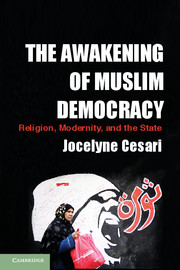Book contents
- Frontmatter
- Contents
- Acknowledgments
- Preface
- Part I THE MAKING OF ISLAM AS A MODERN RELIGION
- 1 Modernization and Politicization of Religion
- 2 Nation-State Building and the Inclusion of Muslim Polities within the Westphalian Order
- 3 Islam in the Constitution
- 4 Nationalization of Islamic Institutions and Clerics
- 5 Islam in the Legal System
- 6 Teaching Islam in Public Schools
- Part II ISLAMISM AS THE PREEMINENT POLITICAL FORCE PRE– AND POST–ARAB SPRING
- Part III THE DISJUNCTION OF DEMOCRACY AND SECULARISM – LESSONS LEARNED FROM THE ARAB SPRING
- Appendix I Religious Violence Index
- Appendix II Egyptian Constitution, Ratified on December 26, 2012. Suspended on July 3, 2013
- Bibliography
- Index
- References
1 - Modernization and Politicization of Religion
Published online by Cambridge University Press: 05 July 2014
- Frontmatter
- Contents
- Acknowledgments
- Preface
- Part I THE MAKING OF ISLAM AS A MODERN RELIGION
- 1 Modernization and Politicization of Religion
- 2 Nation-State Building and the Inclusion of Muslim Polities within the Westphalian Order
- 3 Islam in the Constitution
- 4 Nationalization of Islamic Institutions and Clerics
- 5 Islam in the Legal System
- 6 Teaching Islam in Public Schools
- Part II ISLAMISM AS THE PREEMINENT POLITICAL FORCE PRE– AND POST–ARAB SPRING
- Part III THE DISJUNCTION OF DEMOCRACY AND SECULARISM – LESSONS LEARNED FROM THE ARAB SPRING
- Appendix I Religious Violence Index
- Appendix II Egyptian Constitution, Ratified on December 26, 2012. Suspended on July 3, 2013
- Bibliography
- Index
- References
Summary
The data presented in this section challenge the assumed connection between modernization and secularization that is at the core of most scholarship on political development. More precisely, two factors – separation of church and state and privatization of religion – have been central in measuring the conditions for political development and democratization.
Drawing on the historical experience of Western countries, an academic consensus has emerged that modernization, democratization, and secularization are inextricably linked in any process of political development. However, recent sociological data show that democratization is not dependent on the separation of church and state – and that in fact, government involvement in religion often increases as democracy grows, especially in Christian nations.
In the same vein, scholars such as Benjamin Kaplan have argued that democratization and secularization, even in the West, were not actually as smooth and linear as the narrative wants us to believe, and setbacks were inevitable. For example, the European experience of democratization was part of a reaction to the religiously induced Thirty Years’ War and to the rise of Enlightenment principles, which resulted in various forms of church and state separation. In other words, the differentiation of church and state experienced throughout Europe was the solution to several decades of bloody religious wars during the sixteenth and seventeenth centuries. Ultimately, the matrix of long-term ideas – such as the necessity of separating religion and politics, the perception of religion as a disturbance in public spaces, and the idea that intertwining politics and religion creates absolute power – shapes political imagery and cultures. This imagery is continuously utilized by European political actors to build ideological arguments that secularization goes hand in hand with a decline of religion in the public space.
- Type
- Chapter
- Information
- The Awakening of Muslim DemocracyReligion, Modernity, and the State, pp. 3 - 18Publisher: Cambridge University PressPrint publication year: 2014



